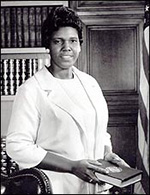African Americans in Houston Politics (1955-1980, Section 12)
African Americans increased their presence in a broad range of fields in Houston and broke new ground in politics and government. Following the Voting Act of 1965 and the division of the state of Texas into single-member legislative districts, the NAACP launched a voting registration drive that brought measurable results.
In 1966, Barbara Jordan was elected to the Texas Senate and Curtis Graves won a seat in the state House of Representatives. Several new black political groups formed, joining the Harris County Council of Organizations which had organized in 1949. With growing strength of black voters, the endorsement of these organizations became an important element in the election of any local official.
Native Houstonian Barbara Jordan , who had been delivered by Dr. Thelma Patten Law, completed her undergraduate studies at Texas Southern University and received a law degree from Boston University in 1959. In 1972, Jordan won the election for the newly drawn 18th Congressional District, becoming the first African-American woman to serve in the U.S. Congress and the first African-American representative from the South since Reconstruction.
In 1979, Mickey Leland was elected to replace Jordan who left Congress for a professorship at the Lyndon B. Johnson School of Public Affairs at the University of Texas in Austin. Mr. Leland, who moved to Houston as a child and graduated from Texas Southern University, was among those TSU students whose sit-ins were supported by the Houston Medical Forum in the early 1960s. Throughout his life, he was an anti-poverty activist and a leading spokesperson for the hungry in the United States and abroad. In 1989, in a plane crash, Mickey Leland died as he had lived, on a mission to an isolated camp in Ethiopia for refugees fleeing civil conflict in neighboring Sudan.



